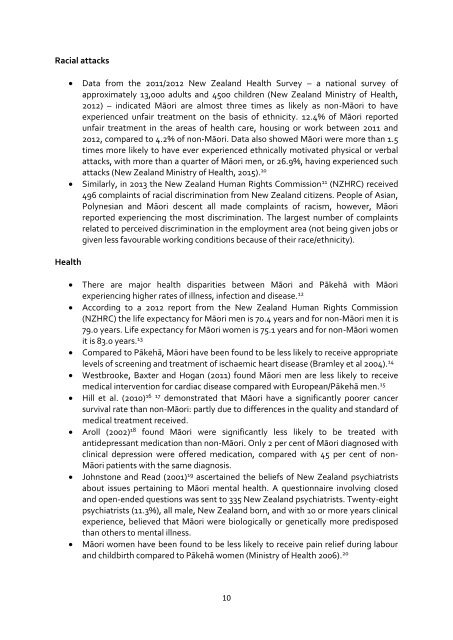UNCONSCIOUS BIAS AND EDUCATION
unconsious-bias-and-education
unconsious-bias-and-education
You also want an ePaper? Increase the reach of your titles
YUMPU automatically turns print PDFs into web optimized ePapers that Google loves.
Racial attacks<br />
<br />
<br />
Data from the 2011/2012 New Zealand Health Survey – a national survey of<br />
approximately 13,000 adults and 4500 children (New Zealand Ministry of Health,<br />
2012) – indicated Māori are almost three times as likely as non-Māori to have<br />
experienced unfair treatment on the basis of ethnicity. 12.4% of Māori reported<br />
unfair treatment in the areas of health care, housing or work between 2011 and<br />
2012, compared to 4.2% of non-Māori. Data also showed Māori were more than 1.5<br />
times more likely to have ever experienced ethnically motivated physical or verbal<br />
attacks, with more than a quarter of Māori men, or 26.9%, having experienced such<br />
attacks (New Zealand Ministry of Health, 2015). 10<br />
Similarly, in 2013 the New Zealand Human Rights Commission 11 (NZHRC) received<br />
496 complaints of racial discrimination from New Zealand citizens. People of Asian,<br />
Polynesian and Māori descent all made complaints of racism, however, Māori<br />
reported experiencing the most discrimination. The largest number of complaints<br />
related to perceived discrimination in the employment area (not being given jobs or<br />
given less favourable working conditions because of their race/ethnicity).<br />
Health<br />
<br />
<br />
<br />
<br />
<br />
<br />
<br />
<br />
There are major health disparities between Māori and Pākehā with Māori<br />
experiencing higher rates of illness, infection and disease. 12<br />
According to a 2012 report from the New Zealand Human Rights Commission<br />
(NZHRC) the life expectancy for Māori men is 70.4 years and for non-Māori men it is<br />
79.0 years. Life expectancy for Māori women is 75.1 years and for non-Māori women<br />
it is 83.0 years. 13<br />
Compared to Pākehā, Māori have been found to be less likely to receive appropriate<br />
levels of screening and treatment of ischaemic heart disease (Bramley et al 2004). 14<br />
Westbrooke, Baxter and Hogan (2011) found Māori men are less likely to receive<br />
medical intervention for cardiac disease compared with European/Pākehā men. 15<br />
Hill et al. (2010) 16 17 demonstrated that Māori have a significantly poorer cancer<br />
survival rate than non-Māori: partly due to differences in the quality and standard of<br />
medical treatment received.<br />
Aroll (2002) 18 found Māori were significantly less likely to be treated with<br />
antidepressant medication than non-Māori. Only 2 per cent of Māori diagnosed with<br />
clinical depression were offered medication, compared with 45 per cent of non-<br />
Māori patients with the same diagnosis.<br />
Johnstone and Read (2001) 19 ascertained the beliefs of New Zealand psychiatrists<br />
about issues pertaining to Māori mental health. A questionnaire involving closed<br />
and open-ended questions was sent to 335 New Zealand psychiatrists. Twenty-eight<br />
psychiatrists (11.3%), all male, New Zealand born, and with 10 or more years clinical<br />
experience, believed that Māori were biologically or genetically more predisposed<br />
than others to mental illness.<br />
Māori women have been found to be less likely to receive pain relief during labour<br />
and childbirth compared to Pākehā women (Ministry of Health 2006). 20<br />
10


